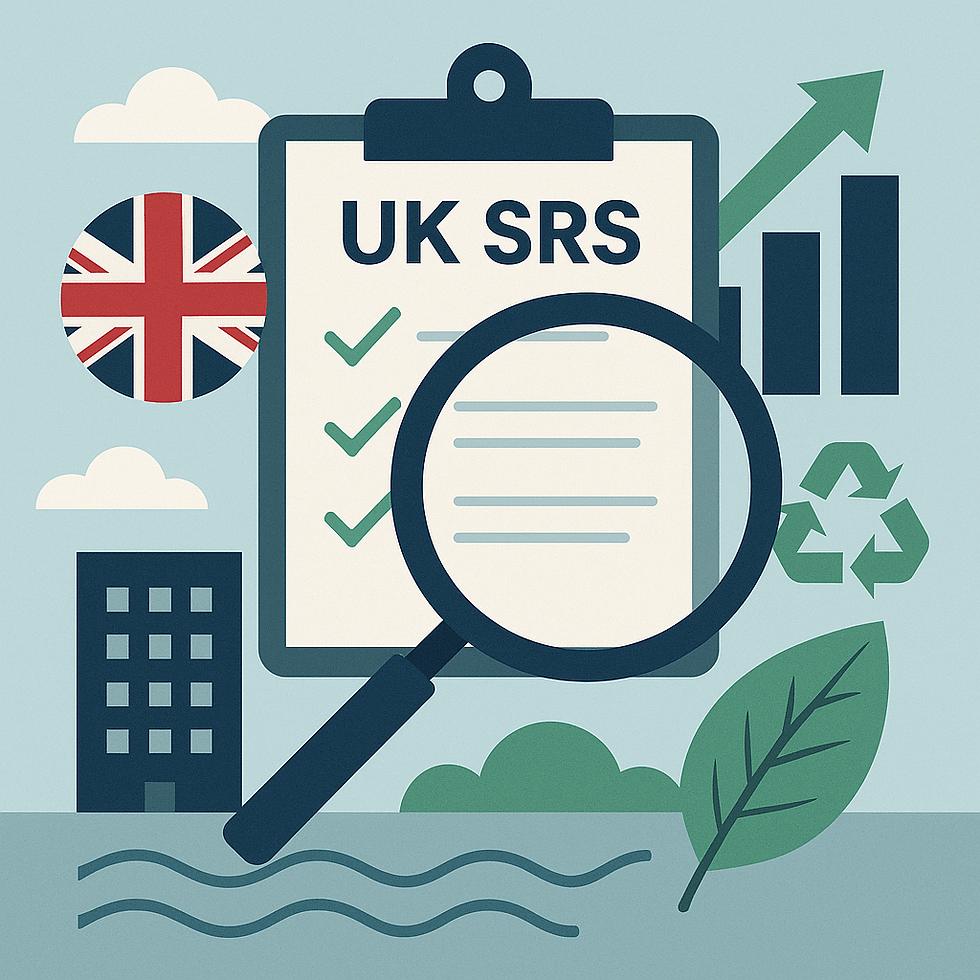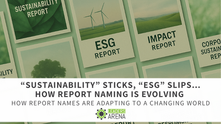UK Sustainability Reporting Standards (UK SRS) Drafts: What You Need to Know
- Aug 13, 2025
- 3 min read
The UK is stepping up sustainability reporting. In June, the government released exposure drafts of the UK Sustainability Reporting Standards (UK SRS) for consultation. These mirror the International Financial Reporting Standards (IFRS) Sustainability Disclosure Standards—IFRS S1 and S2—developed by the International Sustainability Standards Board (ISSB), the global body formed in 2021 to consolidate various ESG disclosure frameworks. The ISSB built on the work of the Sustainability Accounting Standards Board (SASB), whose sector-specific approach to materiality helped shape today’s IFRS standards.

UK SRS S1 (General Requirements) and UK SRS S2 (Climate-related Disclosures) aim to provide investor-relevant sustainability information, especially around climate, while aligning with UK corporate reporting practices. They bring consistency, comparability, and rigour to ESG disclosures, following the familiar Taskforce on Climate-related Financial Disclosures (TCFD) structure: governance, strategy, risk management, and metrics/targets. While closely aligned with IFRS S1 and S2, the UK versions include targeted adjustments to make integration into existing UK reporting more practical.
Topic timing: Companies will have two years to focus on climate disclosures before tackling broader ESG topics, compared to one year under IFRS.
Lagged reporting: The UK SRS doesn’t allow lagged reporting; sustainability disclosures must align with the timing of financial statements.
SASB alignment: While the ISSB requires referencing SASB industry-specific guidance, the UK version softens this to a “may refer” basis, giving companies more discretion.
Financed Emissions: Notably, for the financial sector reporting financed emissions, the UK allows classification systems beyond GICS and mirrors the IFRS S2’s one-year Scope 3 relief.
These differences reflect a practical approach, making alignment for UK businesses easier, without presenting a notable deviation from the international standard. The UK’s endorsement process simply adapts ISSB’s global baseline to fit UK company law and investor expectations.
Who's in Scope – and When
Once the UK SRS reaches the expected endorsement following this consultation, it will initially apply on a voluntary basis. A separate government consultation will deal with which entities will have to report using UK SRS and when. However, mandatory adoption could follow two regulatory avenues:
The FCA will consult on proposals to require the use of UK SRS within UK Listing Rules
The government will consider whether to change the Companies Act to require economically significant entities, including large private companies and LLPs, to report in accordance with UK SRS.
The consultation runs until 17 September 2025, with final standards due by year-end. While reporting remains voluntary to begin with, companies that begin materiality assessments and data planning in 2025–2026 will be well-positioned for future compliance. For listed and large private companies, aligning early with UK SRS reduces complexity and ensures your disclosures meet growing investor expectations for IFRS-aligned reporting.
Key Disclosure Areas – At a Glance
Here’s what companies can expect to disclose under UK SRS and what that means in practice:
Requirement | What it covers | Business implementation |
Sustainability (UK S1) | ESG risks & opportunities that are material to the financial outlook. | ESG & reporting managers must assess the full spectrum of E, S, G — not just climate. |
Climate disclosures (UK S2) | Physical/transition risks, governance, scenario analysis, metrics, targets, and Scope 1–3 emissions. | Climate must be embedded at the board level, data systems built, climate scenarios run, and emissions data gathered across the value chain. |
Connectivity | Align the financial & sustainability reports' timing. | Requires integrated planning between finance, sustainability, and audit. |
Judgment & disclosure transparency | Must justify use or omission of SASB, classification systems, and Scope 3 boundaries. | Teams must document processes and rationale. |
Assurance pathway | A separate consultation on assurance and registered assurance providers is underway. | Prepare internal audit and controls; get external providers on the radar. |
These requirements raise the bar for reporting and sustainability teams. It’s not just about what you disclose but also about explaining why it matters—showing what is material to the business and why. Clear explanations, reliable evidence, and joined-up data systems will be key to credible compliance.
With the UK SRS drafts now on the table, businesses have a clear view of the direction of travel for sustainability reporting. Understanding the scope, timing, and key requirements is the first step—but translating these into action will require careful planning, robust governance, and proper data infrastructure.
In the upcoming Part 2 of this blogpost series, we will explore the practical steps companies can take to prepare for adoption, from setting a phased roadmap to building assurance-ready systems that turn compliance into a strategic advantage.





















